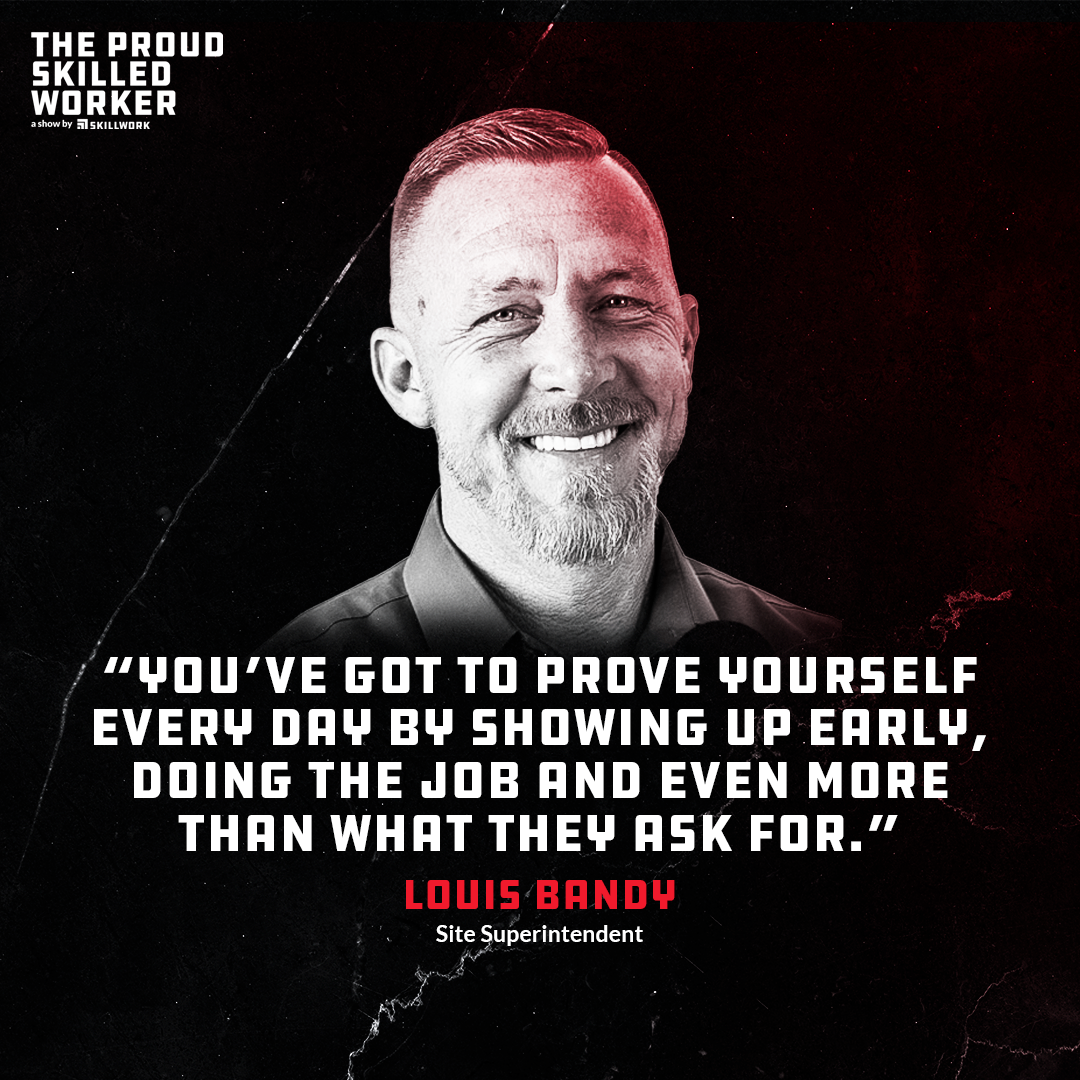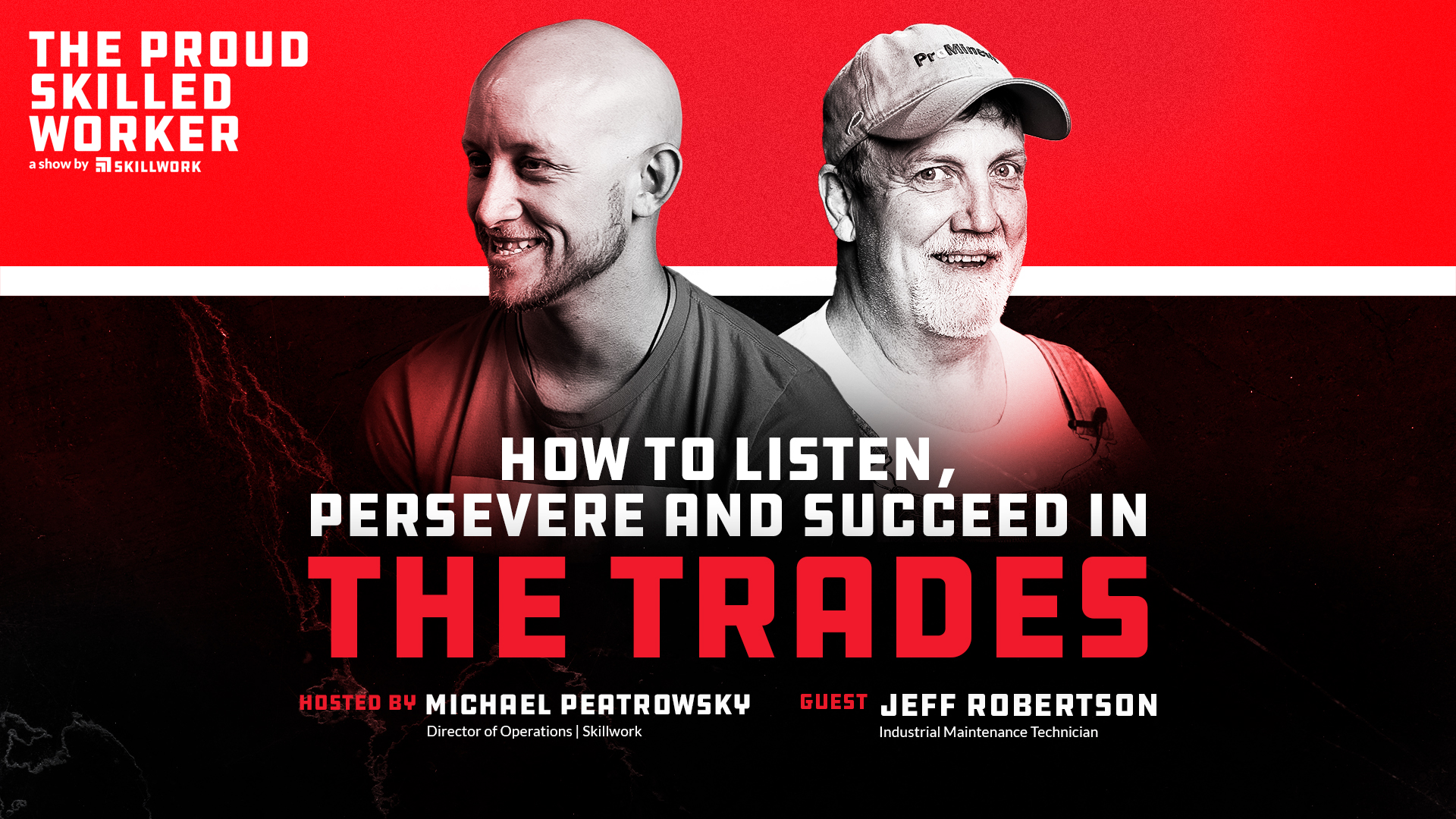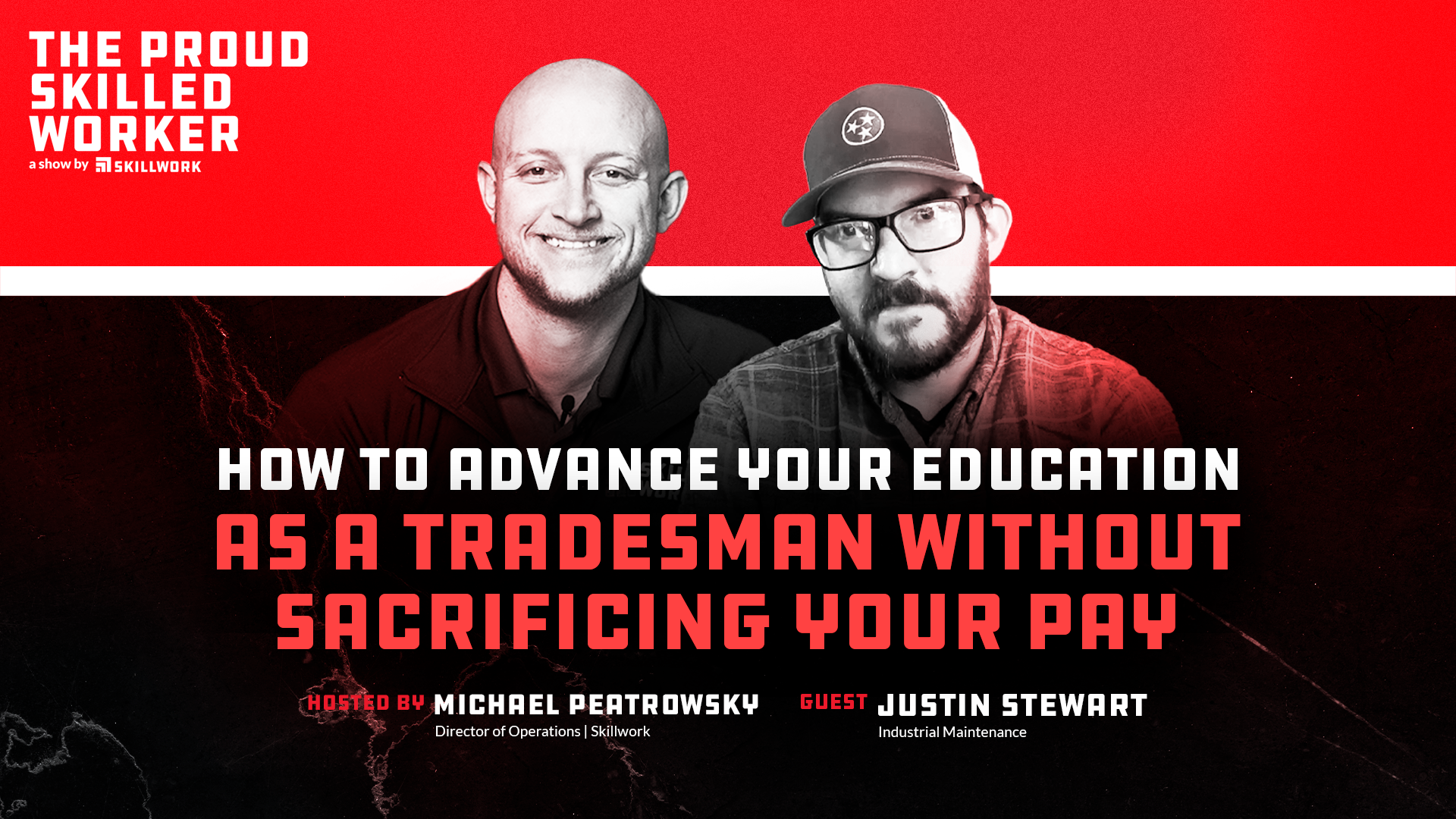Do You Want to Succeed in the Trades? Just Show Up - with Louis Bandy
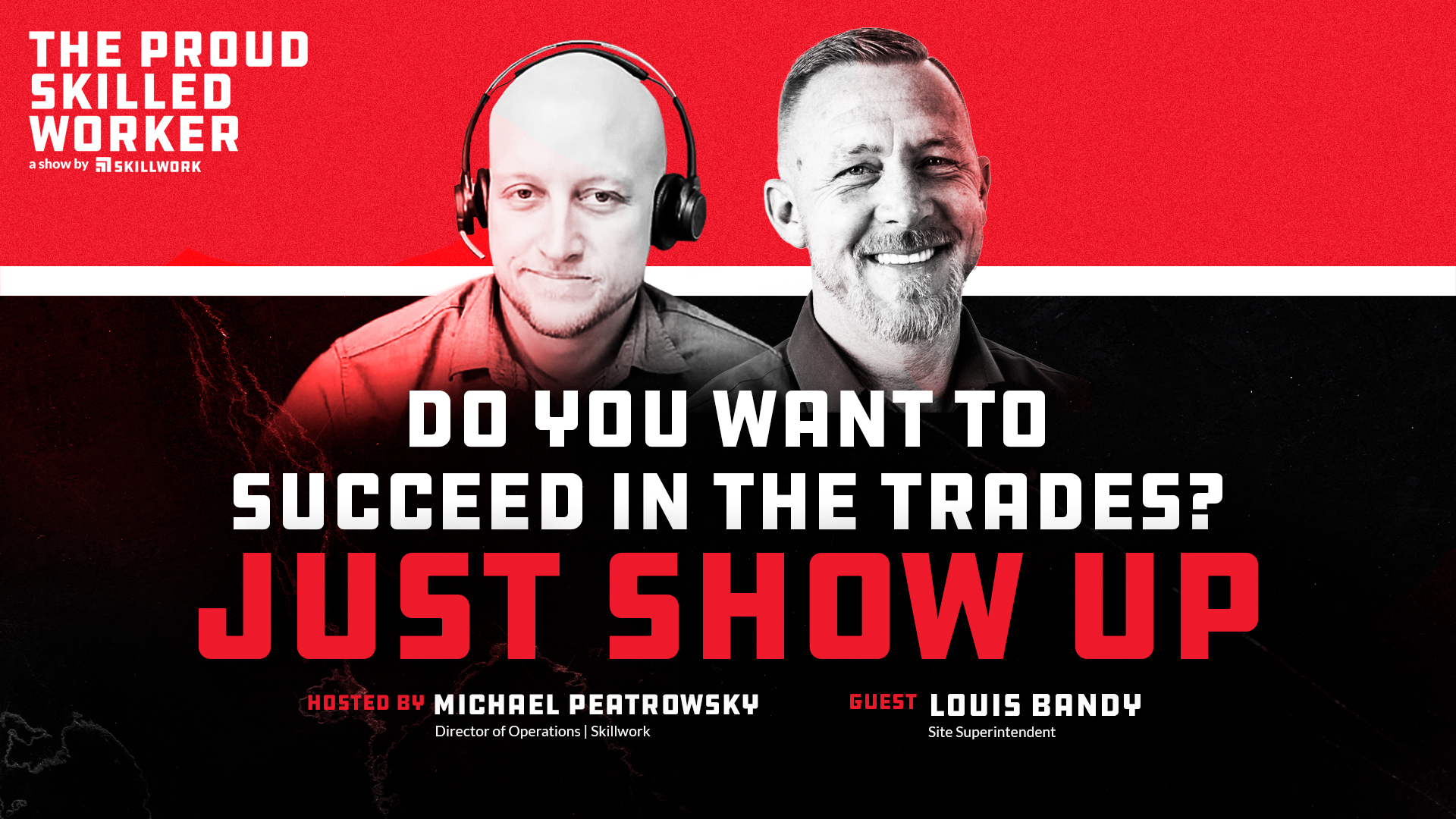
Full Transcription:
Michael Peatrowsky 00:13
Hello, everybody, and welcome to another episode of The Proud Skilled Worker. Today we have an outstanding opportunity to interview Louis Bandy. He's a site superintendent currently in Ohio, working on a vast majority of projects. So, Louis, go ahead, tell everybody a little bit about yourself.
Louis Bandy 00:28
Well, I'm Louis Bandy. I'm originally from New Mexico, I travel the entire country for Skillwork. I own my own construction company, and I've done everything from agricultural building to home building to retail, remodels. Four lovely kids, wife, you name it, I got a full life.
Michael Peatrowsky 00:51
Pretty great life. Definitely, definitely a pretty great life. Four kids, wife, construction company, traveling the country. I mean, how did you? How did you get into trades Louis? Like, how did you get into being in the trades?
Louis Bandy 01:02
Well, out of high school, I thought, "You know what, I've got to do something". And construction was probably the best paying job at the time. That was a few years ago. I knew a guy that had a concrete construction company and needed some help. So I was like, "I gotta do this", and started out as a laborer, sweeping up carrying forms, you know, just the normal.
Michael Peatrowsky 01:28
Work your way up. Got to start somewhere, right?
Louis Bandy 01:31
Right, exactly. I asked a lot of questions, kept my mouth shut, eyes open, ears open. Learned exactly what I needed to do to get to that next level, which you know, would be setting forums and then just went on from there, learned how to frame and it was great. Don't ever regret it. Not for a minute.
Michael Peatrowsky 01:50
It's good. I think, you know, you've talked a lot about some of the points that we actually have some questions today from other skilled workers who are in the field, individuals who reached out to us with questions. So I'm going to deep dive into a lot of what you just said, with their questions, because I think they're gonna want some answers to how you got through that. But I'm curious to know, Louis, what was the biggest challenge for you, in your career, as you advance through? What was the biggest thing that that that you found challenging?
Louis Bandy 02:17
Well, when I was young, it was because of my age. And, you know, a lot of people don't want to give you that shot, because "oh, he's too young. He doesn't know enough yet". Or, you know, yeah, you just you don't have the responsibility for that yet. You got to prove yourself every day, showing up early, getting there doing the job, doing more what than what they asked for. So,
Michael Peatrowsky 02:41
That's great. Yeah, I think, you know, getting into that, I mean, especially as you just talked about, you know, hiring young and then the challenges of getting management to notice your skills and stuff. So we're gonna jump right into some of these questions. Our first question comes from Damon B. And he says, "Why does it seem like you have to know somebody that knows somebody to get started?"
Louis Bandy 03:01
That's a good question. A lot of that is true, especially in the trades anymore. Maybe not so much as it used to be. But knowing the right person that can actually mentor you, in that process, is probably the greatest thing. Yes, you can start with not knowing somebody, but if you know, somebody, they can definitely help you and get you going in the right direction. Unfortunately, that's the way I got into it. So it was meeting the right person and using my brain to make sure that I took everything in so.
Michael Peatrowsky 03:41
Do you think it's more important to know somebody to get into the industry or know somebody and associate with somebody who will help you really grow in the industry?
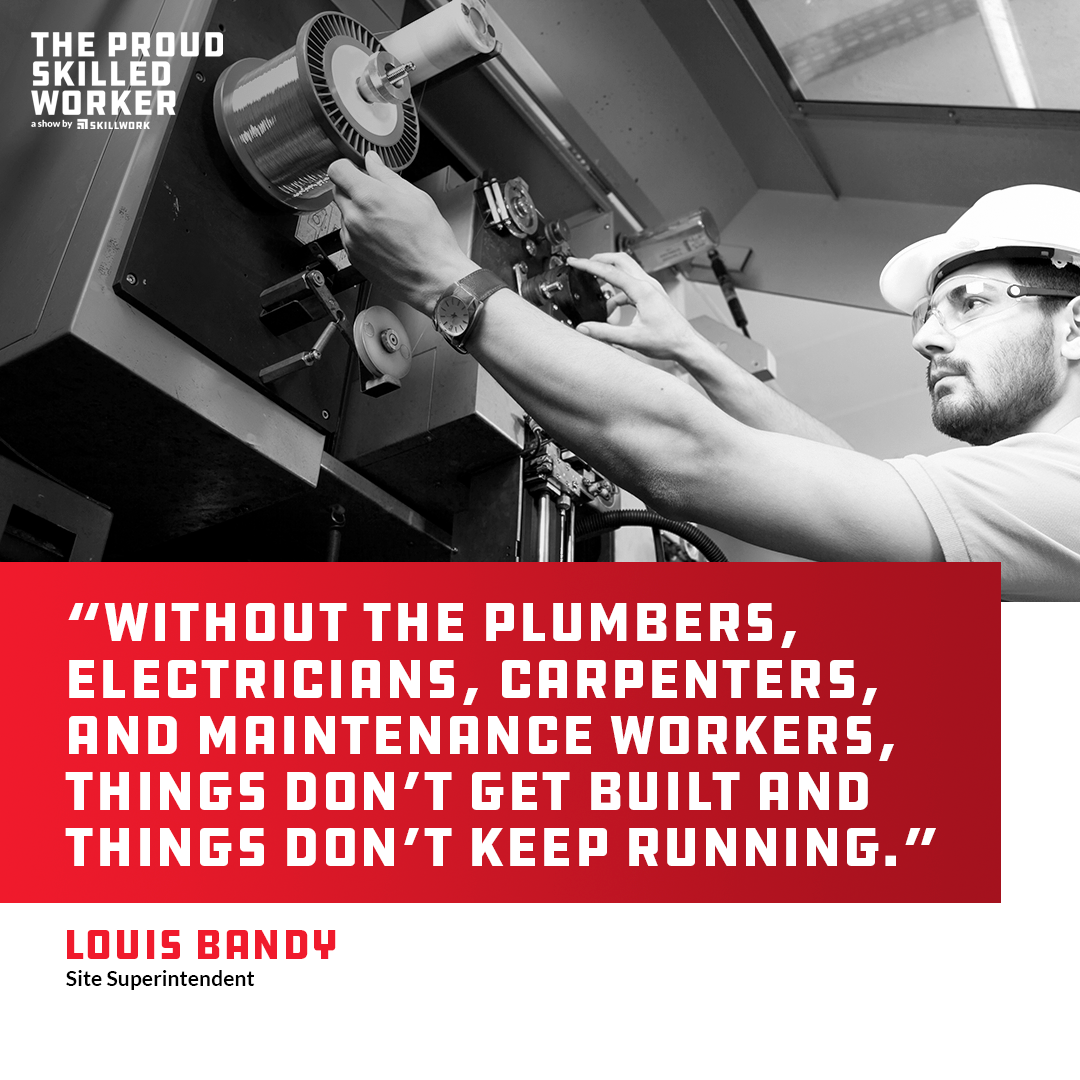
Louis Bandy 03:48
Actually, I think it's better to know somebody and grow in that industry. If you know somebody, you know, sometimes friendships can get strained, if that if you're going in that direction. But yeah, find that person, latch on to him. Learn everything you can. Keep continuing to broaden your knowledge base, talking to other folks out on the site, learning everything that you can to grow your knowledge base, your skill set.
Michael Peatrowsky 04:14
I think that that leads perfectly into like, our next question here is from Kyle G. And he says, "How do you get management to notice your skills?"
Louis Bandy 04:22
First and foremost, don't screw up because they will notice you then, and that's not what you want. But do a good job. Be there early, stay late. Ask questions, continually ask questions. That's the biggest thing I can, if I can impart nothing else, ask questions. You can't learn if you're not asking questions. When I mentor somebody on a site, it's always "the only question stupid question is the one you didn't ask me". I would rather answer hours of questions instead of having to tell somebody to do something over and over again. Ask me the questions. Always ask questions.
Michael Peatrowsky 04:59
Do you You think it's more important to have those hard skills like to be able to like the actual trade skills? Or do you think those soft skills of being able to ask questions and approach people and learn from people are just as important? I just, there's this huge divide, in people who have the knowledge, and then people who want the knowledge, but it doesn't feel like they know how to get it. So I'm trying to understand, like, what's the most important aspect of developing that? Is it having some aptitude to grow into that? Or just having some willingness to kind of lay yourself out and go, "I don't know. But I need you to teach me."
Louis Bandy 05:29
Right. I think it's got to be a little bit of both, honestly. You have to have some mechanical aptitude. The trades will eat you alive if you don't, you know? But it's also that willingness to learn, try new things. Even after 20 plus years of being in the trades, I can always learn something new. And it's by watching, listening, learning. I'm telling you, I mean, I'm a 50-year old guy that learns something new every day, from somebody that's half my age, most of the time. It's all about having the aptitude, mechanical aptitude and then just learning by watching, asking questions. It's got to go hand in hand.
Michael Peatrowsky 06:08
Yeah, I think, you know, as we move forward, then Dylan A has a question about how to how do you stay striving? How do you stay dedicated and wanting to learn in jobs that feel like they're dead ends? Like, can you just feel stuck in. What do you, what do you look for in order to stay striving in those roles?
Louis Bandy 06:24
Well, no job is a dead end. That's a mindset. You can always strive to be better. There may not be a position now, may not be, may seem like there's no other place for you to go. But again, just concentrating on growing your skill set, keep your nose to the grindstone, for lack of a better analogy. Good things happen to people that show up. There's been times that I've had jobs where I thought, oh, "man, I'm going to be pushing this broom for the rest of my life". And then you know, framer gets sick, quits, whatever, you move up in there, you start learning that part of the trade, you know? Just showing up is part of it. I mean, there's no dead-end jobs, just dead-end mindset.
Michael Peatrowsky 07:03
As a site superintendent, I mean, I know you deal with this at times, you probably have people who work for you now who feel like they're in a dead end role. What's your encouragement to them? Like, what do you tell them? "Hey, it's only for a season", you're going to like, how do you communicate with those guys that what they're doing matters and the next step is coming?
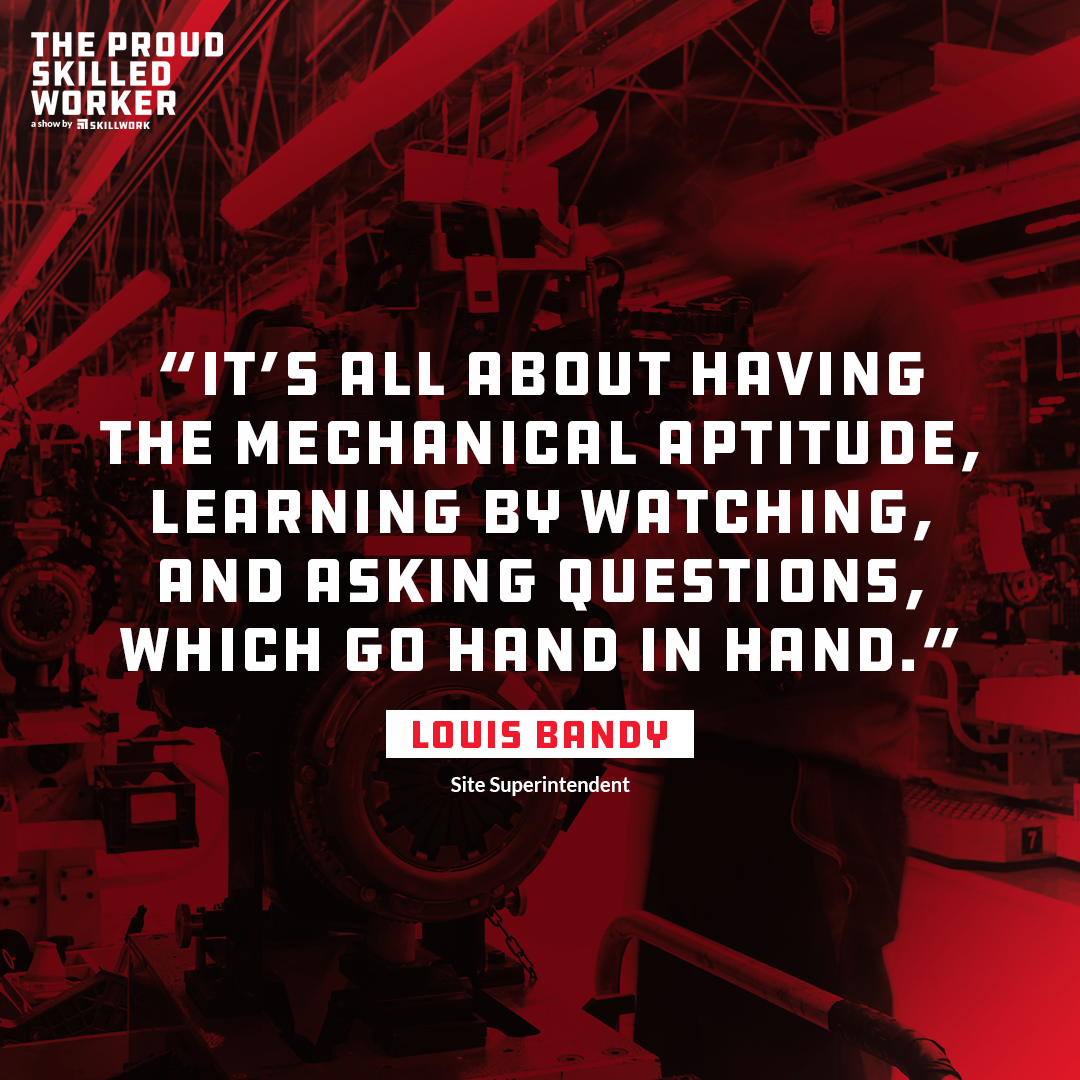
Louis Bandy 07:20
If somebody will show up and take the initiative to learn, you got to take them under your wing and say, "Look, I didn't become a site supervisor overnight. It took me many, many, many, many years to get to where I am. I mean, I was a foreman and I swept and built forms, labor, you know, just keep coming to work. Keep trying your best doing your best work, don't try, just do. And it'll happen. Honestly, if you keep learning your trade, whatever it be, be it plumbing, be it electrical, what have you, keep coming to work, people notice that. I noticed that. That's the biggest thing. If you come to work and work every day, I have no problem getting you to that next level. Supervisors, foremen supervisors, site supervisors, project managers, they all notice that kind of thing.
Michael Peatrowsky 08:09
Yeah. Previously, we had a we had an individual on the podcast who's like life acronym was SHAPE. And so the S is just show up. Like, that's the hardest thing you have to do is show up. And it's it's interesting to me like how consistent that theme is through maintenance fields, through the construction field, and from a site supervisor all the way down to a maintenance team is everybody just wants you to show up so they can help you grow.
Louis Bandy 08:33
Right, exactly. Yeah.
Michael Peatrowsky 08:35
It leads into our next question is that and this is for this is from Mark H. And it's kind of a combined question is, "Why does anybody what is, why does it feel like people don't want to do manual labor anymore? And why does it feel like the trades are eating their young? Like the people who come in, like, why does it feel like they're getting spit out before they can grow? So that's a two part question. But I definitely think there's a lot of merit to what we're talking about here.
Louis Bandy 08:59
Yeah. First part of your question there is, I believe in this country, everybody's been taught that, you know, if you don't have a college education, you're nothing. The trades, as we all know, are some are paying better than a lot of college graduates are making now. It's just starting out. So we've they've been bad mouthing for so long, that whole blue collar versus white collar. I've got the bluest white collar there is you know, I'm right there in the middle. So the trades have been demonized for so long. It he's a plumber. He's just an electrician, just a carpenter. Without the plumbers, electricians, carpenters, maintenance, guys, things don't get built, things don't keep running, you know? And it's time that we start really developing kids in high school, start pushing them towards trade. College isn't for everybody. We know that. Trades? Not for everybody. But if you have that aptitude, I think it's great. I mean, I talked to young men and women all the time, just you know, let them know, this is a good good life, you make good money, as good money as some doctors. It's it's one of those things. And now the second part of your question, you want to review that again with me?
Michael Peatrowsky 10:10
Yeah, it was, "Why does it feel like the trades eat their young a little bit?" Like why does it feel like they either push people out or people fail to like grow in it? Or maybe that's just perception?
Louis Bandy 10:21
I think a little bit of it is perception. Today's mindset is not what it used to be. Everybody wants something right now, right now. Unfortunately, in trades, you've got to learn, you're not going to school all the time. So you've got to learn every day, it takes a little longer than sitting in classroom for six or eight hours a day. Unfortunately, you don't have a focus time to teach a skill, a skill, this skill, you're getting all the skills thrown at you as you go. That's gonna soak in. And you know, sometimes I think that's part of the reason that people feel the way they do now. They eat their young. And there's also those guys out there, us old folks, that like to give the younger crowd, you know, a ration, if you will, but yeah, I mean, I think it's a little bit of both.
Michael Peatrowsky 11:04
Yeah, I think you mentioned something that that I want to hit on is college isn't for everybody. But we spent every bit of almost three decades telling people they had to have a college degree to succeed, right? And then the last two to five years, we've started to say, "oh, no, you don't back out of that". But we're talking a generational educational shift in how we talk to our kids and how we talk to our schools, and how we educate people on their career paths. So this problem isn't going to be fixed overnight, Louis, and I think you know that, but I just want to say like, you can't preach something for 30 years that everybody needs a degree. And then the next day say, "oh, no, you don't" and expect people to just get on board with that. This is a problem that that was generated over decades, and it's going to take time to fix it. And it's definitely going to take time to grow it in patience and understanding that, you know, even for older guys, like you, maybe maybe with the junior guys, maybe we just don't give them as hard time, and maybe the younger guys get a little tougher skin. I think there's probably both sides of that coin. But I think I think there's something to be learned from both ends of this, that it's not perfect, because we created this system, but we can fix the system if we're all willing to do what we have to
Louis Bandy 12:13
Right? Exactly. I couldn't agree more. I mean, we all have to do our part. Again, like you said, the old guys, we need to lay off the young guys. The young guys get a little tougher skin. Yeah. But we do have to start changing that mindset that the only way is college or the only way is trades. There's someplace that we can meet in the middle there.
Michael Peatrowsky 12:32
Yeah, absolutely. And one of the other cool things you said that I don't want to get breezed over. But I do want to highlight that, factually, it's very true. So I don't want people to think this is just an off the cuff. Is there are site superintendents, and there are individuals in the trades right now who make as much or more than doctors who go to school for eight years.
Louis Bandy 12:48
It's true.
Michael Peatrowsky 12:49
There's no ifs, ands or buts about that statement. The facts back back that up. And quite frankly, if your goal in life is to be financially sound, the trades is it is an excellent opportunity for you. And it's available right now. Right available, we have 10 years.
Louis Bandy 13:06
Right, exactly. And you don't have that student debt.
Michael Peatrowsky 13:09
That's right. I'm curious to know, Louis, you had mentioned college degrees and as a site super, I know that some individuals do have a degree and some don't. Do you have your degree?
Louis Bandy 13:16
I do, in business.
Michael Peatrowsky 13:19
Okay, did you get that right out of high school? Or have you gotten that over time just to grow?
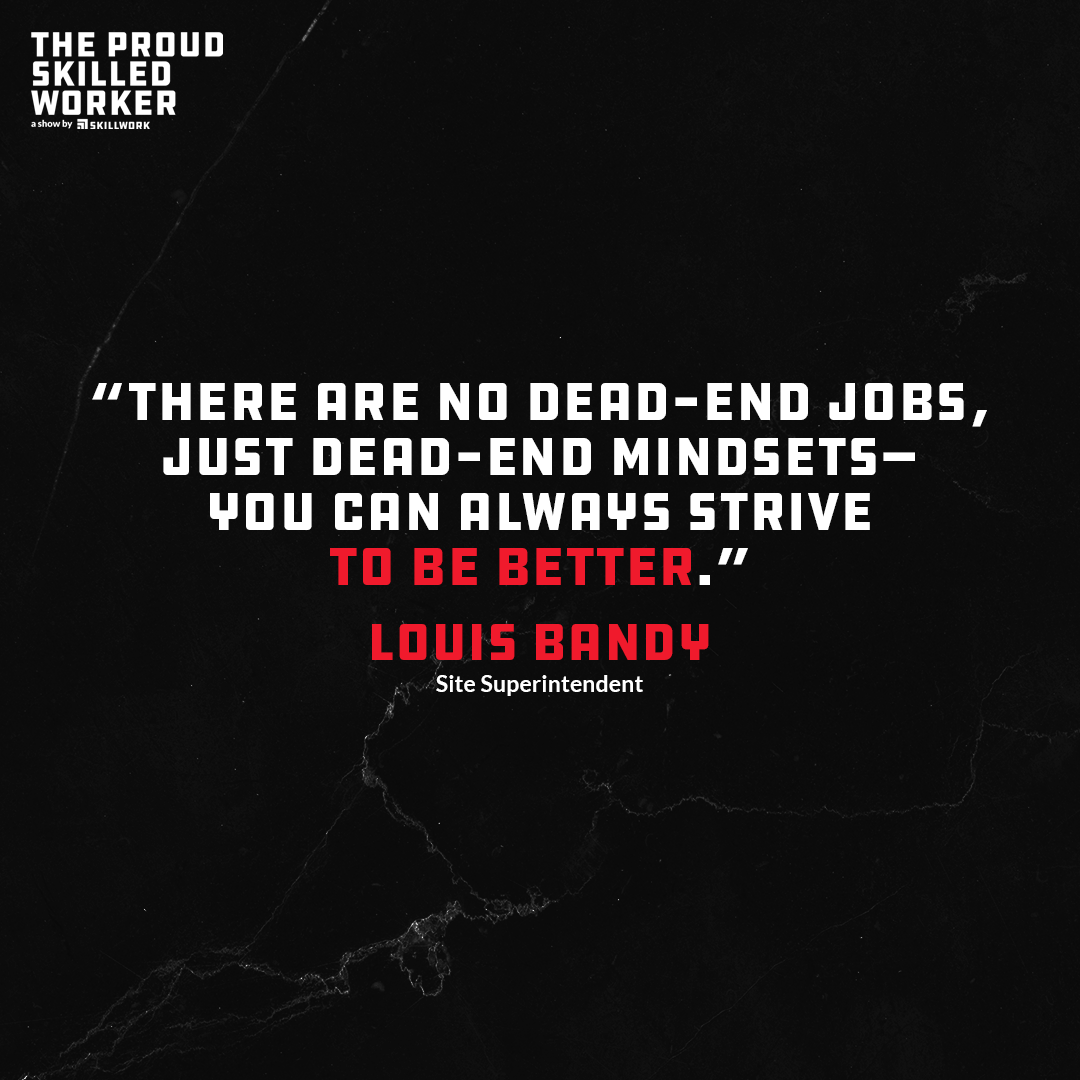
Louis Bandy 13:24
Over time. Yeah, just trying to grow my skill set. So,
Michael Peatrowsky 13:27
What what led you to decide that you wanted to add that into your toolbox? So you have all these, these skills and training and OJT? And then you went, you said, "Well, I want a degree in there, too".
Louis Bandy 13:39
Right, well, you know, I think that it was partially because I wanted to plan for the future when my body wasn't what it used to be. You know, when I wasn't such a young strap, strapping stud, but part of it just wanted to grow. Of course, I did it at night, and weekends and every other thing. I mean, it took me longer than most, but yeah,
Michael Peatrowsky 14:00
I mean, definitely, if you want it, you have to sacrifice for it. There's only so much time in a day, we all get 24 hours. How are you spending your time?
Louis Bandy 14:08
Right, exactly, exactly. Gotta grow. I could have just as well went and got an electrical degree, right? I just weighed the options and you know, a business degree, you can't go wrong.
Michael Peatrowsky 14:17
That's right.
Louis Bandy 14:18
I use it every day.
Michael Peatrowsky 14:22
So last question we have here is from Brandon A, and he says, "What can I do to find myself in new and challenging situations on the job site or at work?"
Louis Bandy 14:30
New and challenging? That's a good question. Depending on what trade you're in. Again, it's asking, "Hey, you guys are building X. Can I get in here and watch you and help you?" And it's putting yourself out there to get the knowledge. I don't know too many guys that don't want to teach young people, the younger generations. Something. Jump in there, ask questions, volunteer, stay late. Come in early.
Michael Peatrowsky 14:58
So I appreciate that, Louis, I think that in this part of the show, what I typically do is I open the floor to you. And if you could, if you could just say one thing to everybody in your industry, this is your 30 second soapbox, or five minutes, however long it takes you to just say, "here's what you should be doing". What what would that thing be, Louis? What is that?
Louis Bandy 15:17
Well, I'm a man of few words, as you well know, my thing would be: show up, learn everything you can, don't ever think that you know everything that there is to know about your trade, your skill, whatever. There's always room for improvement. Improve yourself daily. Learn something new every day. Again, show up, stay late. Nobody owes you a paycheck, go out there and earn it. Honestly, that's if if I had nothing else, nobody owes you a paycheck, get out there and earn it.
Michael Peatrowsky 15:45
That's great. It's huge. Thank you, Louis, for being on the show. And everybody, thank you so much for listening to The Proud Skilled Worker. Please subscribe. We put out new content every two weeks. We continue to have guests. We continue to encourage individuals to reach out to us. We're willing to host anybody on the show. We'll go through a battery of questions. We'll have these open conversations with anybody and everybody who wants to reach out and be a part of this. Thank you so much. Please support us across the platforms: YouTube, Apple Podcast, Spotify. Go to the website at skillwork dot com if you want to learn more and be more part of this. Everybody, thank you so much, and we'll see you in two weeks.
